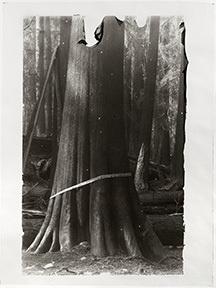
The "Native Ecologies" panel discussion focuses on Indigenous histories and approaches to fire management, knowledge production, and ecological stewardship. The panel is tied to the opening reception for the "Ghost Forest" exhibit and will include panelists Kari Marie Norgaard, David G. Lewis, and Joe Scott. "Ghost Forest" opening reception immediately following in the Lawrence Hall lobby.
Dr. Kari Marie Norgaard is a non-Native Professor of Sociology and Environmental Studies who lives and thinks in Kalapuya lands at University of Oregon. She has also worked as a consultant for the Karuk Tribe on tribal environmental policy since 2003. Over the past fifteen years Dr. Norgaard has published and taught in the areas of environmental sociology, Indigenous environmental justice, gender, and sociology of emotions. She is the author of over three dozen articles and book chapters, Living in Denial: Climate Change, Emotions and Everyday Life (MIT Press, 2011) and a recipient of the Fred Buttel Distinguished Contribution Award, and together with Ron Reed, a Sociology of Emotions Recent Contribution Award. Her latest book Salmon and Acorns Feed Our People: Nature, Colonialism and Social Action was a 2020 finalist for the C.W. Mills Award of the Society for the Study of Social Problems.
David G. Lewis, PhD, is an OSU Assistant Professor of Anthropology and Ethnic Studies & Indigenous Studies. He is a member of the Grand Ronde Tribe, descended from Takelma, Chinook, Molalla, and Santiam Kalapuya peoples. A professional consultant, educator and researcher, he teaches at local universities and colleges and contracts with tribes, local governments and nonprofits. He has experience in archival organization, museum development, exhibit curation, traditional cultural property nomination, tribal ethnohistoric research, tribal maps, traditional ecological knowledge, and presentations to large and small gatherings. David lives at Chemeketa, where he researches and writes histories of the western Oregon tribes, published on his blog, The Quartux Journal: ndnhistoryresearch.com.
Joe Scott is a member of the Confederated Tribes of Siletz Indians, a descendent of the Rogue River Tribes of Southern Oregon. He currently lives and studies on Kalapuya Illahee as Curriculum Director for the Traditional Ecological Inquiry Program, partnering with regional land stewards to serve tribal families to support environmental stewardship, promote food sovereignty, and explore traditional ways of knowing through the exploration of Indigenous ecological science. He is a traditional ecologist and cultural fire practitioner, and a lifelong Tribal teacher and learner.
The panel discussion and exhibit is part of “Haunting Ecologies: The Past, Present, and Future of Feminist and Indigenous Approaches to Forest Fire,” a project sponsored by the Center for the Study of Women in Society (CSWS) and UO Environment Initiative partnership.

